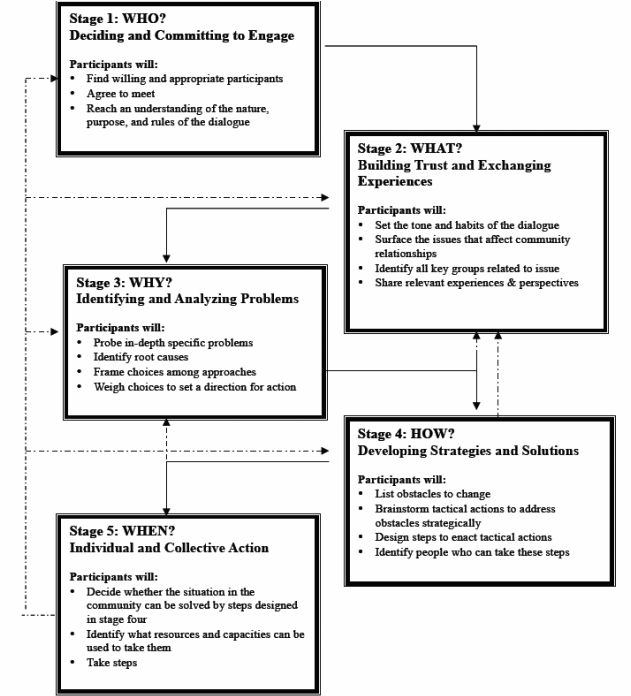| Sustained Dialogue at MSU |
What is dialogue?
"Dialogue is a process of genuine interaction through which human beings listen to each other deeply enough to be changed by what they learn. Each makes a serious effort to take other's concerns into her or his own picture, even when disagreement persists. No participant gives up his or her identity, but each recognizes enough of the other's valid human claims that he or she will act differently toward the other."
- Dr. Harold Saunders, Founder and President of the International Institute for Sustained Dialogue
- Dr. Harold Saunders, Founder and President of the International Institute for Sustained Dialogue
The Components of Sustained Dialogue
Consistent Dialogue Meetings
Students are asked to meet regularly and explore topics of their choice with individuals who they wouldn't have otherwise had any space to interact. These discussions are held frequently. Some groups meet once per week while other groups meet every other week for dialogue and every other week for service or a social component.
Sustained Participation
Each SD group consists of 6-12 participants who are asked to repeatedly meet with each other. This group is most well-suited for SD when it is reflective of community diversity.
Run by Students
Two students, trained by SDCN, moderate each groups' dialogue meetings. SD student leaders organize the dialogues and the tasks surrounding creating an active student group on campus.
Purposeful Content
Dialogues focus on probing a particular subject that divides the community, especially those that are often ignored or seen as normal. Each group of students works towards a collective action designed to engage others and address these problems in the larger campus community. SDCN member schools receive access to our curriculum and tools.
Student-created Events and Action
SD students serve as a resource to their campus and community. As part of Stages 4 and 5 of SD, dialogue participants and SD student leaders organize events aimed at turning their dialogue content into useful changes in the university community. Some groups choose to make recommendations to administrators, some choose to hold well-publicized, awareness-building events, others choose to hold film screenings, forums, and town-hall meetings. The resulting action is created with the input of the diverse members of dialogue groups.
Students are asked to meet regularly and explore topics of their choice with individuals who they wouldn't have otherwise had any space to interact. These discussions are held frequently. Some groups meet once per week while other groups meet every other week for dialogue and every other week for service or a social component.
Sustained Participation
Each SD group consists of 6-12 participants who are asked to repeatedly meet with each other. This group is most well-suited for SD when it is reflective of community diversity.
Run by Students
Two students, trained by SDCN, moderate each groups' dialogue meetings. SD student leaders organize the dialogues and the tasks surrounding creating an active student group on campus.
Purposeful Content
Dialogues focus on probing a particular subject that divides the community, especially those that are often ignored or seen as normal. Each group of students works towards a collective action designed to engage others and address these problems in the larger campus community. SDCN member schools receive access to our curriculum and tools.
Student-created Events and Action
SD students serve as a resource to their campus and community. As part of Stages 4 and 5 of SD, dialogue participants and SD student leaders organize events aimed at turning their dialogue content into useful changes in the university community. Some groups choose to make recommendations to administrators, some choose to hold well-publicized, awareness-building events, others choose to hold film screenings, forums, and town-hall meetings. The resulting action is created with the input of the diverse members of dialogue groups.

